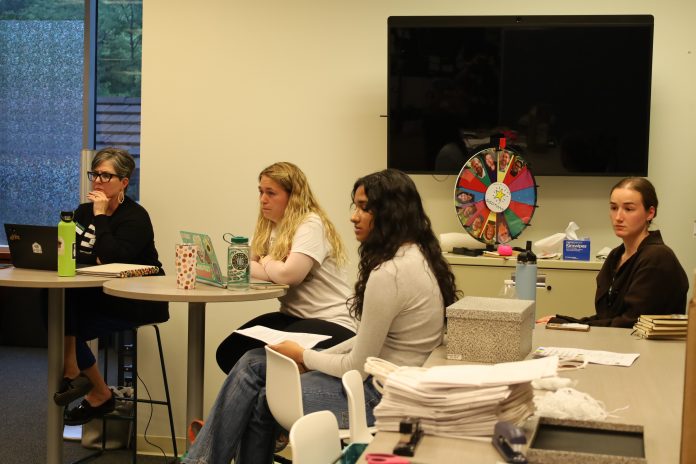Tuesday, May 2, President of the College of William and Mary’s Student Assembly Sydney Thayer ’24 announced her veto of The Accurate Tracking and Transparency of Event Numbers and Details Act (ATTEND), sponsored by Sen. Max Berckmueller ’23, Sen. Sean Nguyen ’25 and Sen. Hazel Vineet ’25.
“Considering the infrastructure that we currently have in place, it is not always going to be the most effective use of personnel to codify attendance tracking for EVERY Student Assembly event/activity,” Thayer wrote in an email to the SA Senate. “Student Assembly frequently hosts events that are on a scale much larger than that of student organizations funded through the OBAC process.”
Thayer cited the scope of the events that SA usually hosts.
“The level of personnel that would be required to successfully track attendance at our large-scale, campus-wide events such as the Royal Ball or the Green & Gold Bash prohibits us from being able to effectively implement this code change and not be in conflict with our governing documents,” Thayer wrote.
While she supports the use of after-action reports for SA-hosted events, Thayer said attendance tracking is not necessary to assess them.
“Having an exact attendance count for these events would not meaningfully change our ability to effectively evaluate the success of these events, given that we already have a number of Student Assembly members and our advisors in attendance who we can rely on to provide accurate assessments about the number of students in attendance,” Thayer wrote, voicing her opposition to the practice of attendance tracking.
“The same is not true about events funded through OBAC,” she added.
“Having an exact attendance count for these events would not meaningfully change our ability to effectively evaluate the success of these events, given that we already have a number of Student Assembly members and our advisors in attendance who we can rely on to provide accurate assessments about the number of students in attendance”
SA President Sydney Thayer ’24
The SA Senate passed the act the week prior on Tuesday, April 25, with 12 ‘yes’ votes, five ‘no’ votes and two abstentions.
Director of Student Leadership Development Anne Arseneau ’89 MA.Ed ’92 voiced her opposition to the passage of the bill at the meeting, citing logistical reasons.
“I do not favor the attendance tracking, I just want to say that for the record,” Arseneau said. “I just want you to think about that in terms of your ability to provide infrastructure like, you know, to do an event like Royal Ball this weekend where we're anticipating 700 people, our level of volunteering for those things. I support wholeheartedly an after-action review, where a significant portion of that is to provide an attendance overview, but to actually compel a specified Campus Labs tracking, I think limits you in some ways for some events that it might not be the right thing.”
Nguyen said the bill would create a new culture of more accountability.
“[Putting] this mechanism in place actually encourages this shift in culture with students, especially if their sponsors are being charged to attend an event and track it, they'll have that responsibility to do so,” Nguyen said.
This marks the first veto since former SA President Meghana Boojala ’22’s veto of The New Leaf Subsidy Act. Thayer’s predecessor, former SA President John Cho ’23, did not exercise his veto powers.
The veto comes amidst contradictory guidelines between the Code and the Constitution of Student Assembly.
“All legislation, with the exception of amendments to the Code and/or Constitution of the Student Assembly and non-binding Senate resolutions as specified in Article I, Section IV, Clause VIII of the Constitution, may be vetoed by the Student Assembly President,” Section 2.1-5.2. 'Submission' in the Code of Student Assembly reads.
However, the Constitution grants Thayer the ability to veto all legislation passed by the Senate.
“Every bill which shall have passed the Senate, shall, before it becomes an act, be presented to the President of the Student Assembly within seven days while the College is in session; if the President approves they shall sign it and it shall become a resolution, but if not, the President shall return it within seven such days, with objections, to the Senate, who shall proceed to reconsider it. The Senate may overturn a Presidential veto with a three-fourths vote,” Section III: Legislative Process Clause IV of the Constitution reads.
SA Attorney General Owen Williams ’23 MPP ’25 said the cited section of the Code should be considered nullified.
“As the Constitution is the supreme governing document of the Assembly, in matters of contradiction between the two documents the Constitution holds supreme authority. Therefore, the Student Assembly President maintains the ability to veto ‘Every bill which shall have passed the Senate’. Under this authority President Thayer’s recent veto was indeed legal and the corresponding clause in the Code is moot,” Williams wrote in a memorandum addressed to The Flat Hat, Thayer and Chair of the Senate Sen. Justin Bailey ’24.
There are no indications that the Senate will formally reconsider the legislation with a vote.
Vineet laid out future plans for the legislation.
“Well, we kind of expected the veto, even though it was disappointing. I do think the main premise of this bill has always and always will be equity. And we want to recognize that, like, equity between RSOs and Student Assembly, and we want to make sure that we're recognizing that. And I do think that with some edits and, you know, like provisions for events that are really large, I think this bill could be successful and could pass,” Vineet said.

